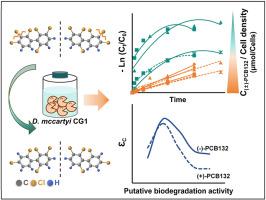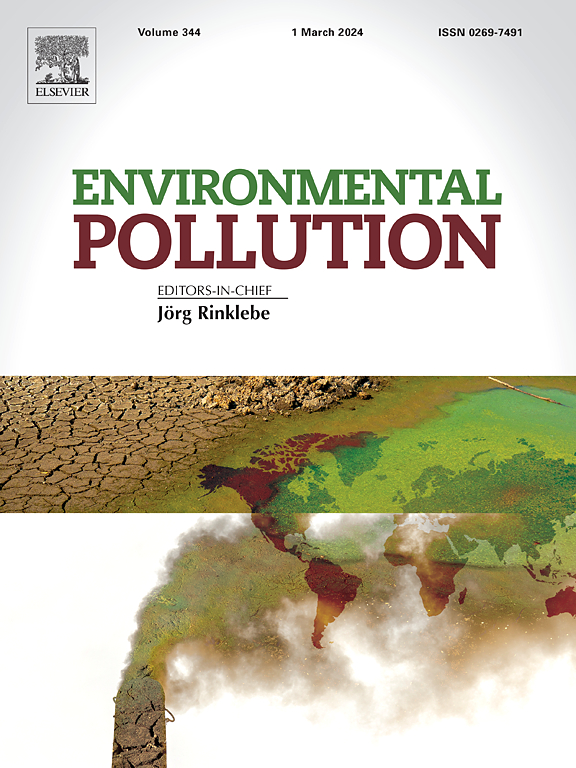Insights into anaerobic biotransformation of Polychlorinated Biphenyls in Dehalococcoides mccartyi CG1 through Kinetic and Stable Isotopic Analysis
IF 7.6
2区 环境科学与生态学
Q1 ENVIRONMENTAL SCIENCES
引用次数: 0
Abstract
Microbial degradation processes largely govern the fate of organic contaminants in the environment. Therefore, reliable evaluation of in situ biodegradation is essential for effective on-site contaminant management. Although compound-specific isotope analysis (CSIA) shows significant potential for assessing in situ attenuation and evaluating chemical and biodegradation mechanisms, empirical evidence supporting its application in the microbial degradation of polychlorinated biphenyls (PCBs) is still lacking. Microbial degradation of trace persistent organic pollutants is a multifaceted process influenced by various factors, with substrate concentration being a key factor affecting isotopic fractionation. Herein, to the best of our knowledge, for the first time, batch biodegradation experiments were conducted for analyzing the kinetics and carbon/chlorine isotope fractionation of chiral substrates (−)/(+)-PCB132 by Dehalococcoides mccartyi CG1 at varying substrate concentrations (0.3, 1.7, 2.4, 3.5, and 4.7 μM). The dechlorination of (−)/(+)-PCB132 was predominantly consistent with pseudo-first-order kinetics (kobs) in most cases. However, when the ratio of substrate concentration to the density of functional microorganisms falls below a specific threshold (<5.3 × 10−3 μmol /(× 1010 CG1 cells)), a decline in observed kobs is noted as degradation time increases, ultimately approaching the lower limit of bioavailability (kobs = 0). Notably, substantial normal isotope fractionation was observed for the first time during the anaerobic degradation of (−)/(+)-PCB132, with the isotopic enrichment factor (ƐC) varying from −1.27 ± 0.18‰ to −2.22 ± 0.01 for (−)/(+)-PCB132. Our findings indicate that, in addition to the effect of substrate concentration, the observed isotope fractionation of (−)/(+)-PCB132 was considerably affected by putative biodegradation activity. Enhanced activity within the anaerobic degradation system resulted in pronounced isotope masking. This study aims to contribute to a foundational understanding of bacterial reductive dehalogenation of PCBs at differing substrate concentrations while considering bioavailability.

求助全文
约1分钟内获得全文
求助全文
来源期刊

Environmental Pollution
环境科学-环境科学
CiteScore
16.00
自引率
6.70%
发文量
2082
审稿时长
2.9 months
期刊介绍:
Environmental Pollution is an international peer-reviewed journal that publishes high-quality research papers and review articles covering all aspects of environmental pollution and its impacts on ecosystems and human health.
Subject areas include, but are not limited to:
• Sources and occurrences of pollutants that are clearly defined and measured in environmental compartments, food and food-related items, and human bodies;
• Interlinks between contaminant exposure and biological, ecological, and human health effects, including those of climate change;
• Contaminants of emerging concerns (including but not limited to antibiotic resistant microorganisms or genes, microplastics/nanoplastics, electronic wastes, light, and noise) and/or their biological, ecological, or human health effects;
• Laboratory and field studies on the remediation/mitigation of environmental pollution via new techniques and with clear links to biological, ecological, or human health effects;
• Modeling of pollution processes, patterns, or trends that is of clear environmental and/or human health interest;
• New techniques that measure and examine environmental occurrences, transport, behavior, and effects of pollutants within the environment or the laboratory, provided that they can be clearly used to address problems within regional or global environmental compartments.
 求助内容:
求助内容: 应助结果提醒方式:
应助结果提醒方式:


